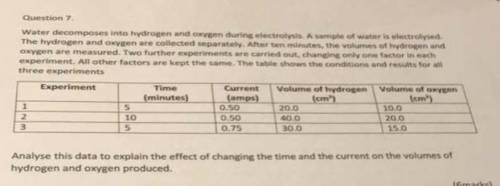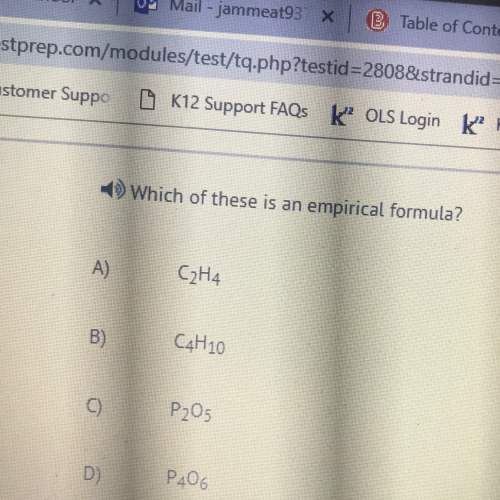Question 7.
Water decomposes into hydrogen and oxvgen during electrolysis. A sample of water is...

Chemistry, 06.03.2020 16:53 tinyturtles
Question 7.
Water decomposes into hydrogen and oxvgen during electrolysis. A sample of water is electrolysed.
The hydrogen and oxygen are collected separately. After ten minutes, the volumes of hydrogen and
oxygen are measured. Two further experiments are carried out, changing only one factor in each
experiment. All other factors are kept the same. The table shows the conditions and results for all
three experiments.
Analyse this data to explain the effect of changing the time and the current on the volumes of
hydrogen and oxygen produced.
(6marks)


Answers: 1


Other questions on the subject: Chemistry

Chemistry, 22.06.2019 06:30, coreyslotte
Use examples from the article to explain one positive and one negative effect that chemistry has had on society.
Answers: 2

Chemistry, 22.06.2019 08:00, anglacx5465
Why are pipes bursting in the in extremely cold weather?
Answers: 2

Chemistry, 22.06.2019 12:30, hayleyconsole
Nebulae are enormous clouds in outer space. they are made mostly of hydrogen gas, helium gas, and dust. some nebulae glow brightly, while others do not. the stars that people see are huge, bright balls of glowing gas. they are made mostly of hydrogen and helium. which statement correctly describes other ways in which nebulae and stars are different? a. stars can form inside a nebula but a nebula can never be produced by any star. b. a star always has a higher density than a nebula. c. stars can never form inside a nebula but a nebula can be produced by any star. d. a nebula always has a higher density than a star.
Answers: 3

You know the right answer?
Questions in other subjects:



History, 08.09.2021 14:00

Social Studies, 08.09.2021 14:00

English, 08.09.2021 14:00



English, 08.09.2021 14:00

Mathematics, 08.09.2021 14:00

Mathematics, 08.09.2021 14:00




